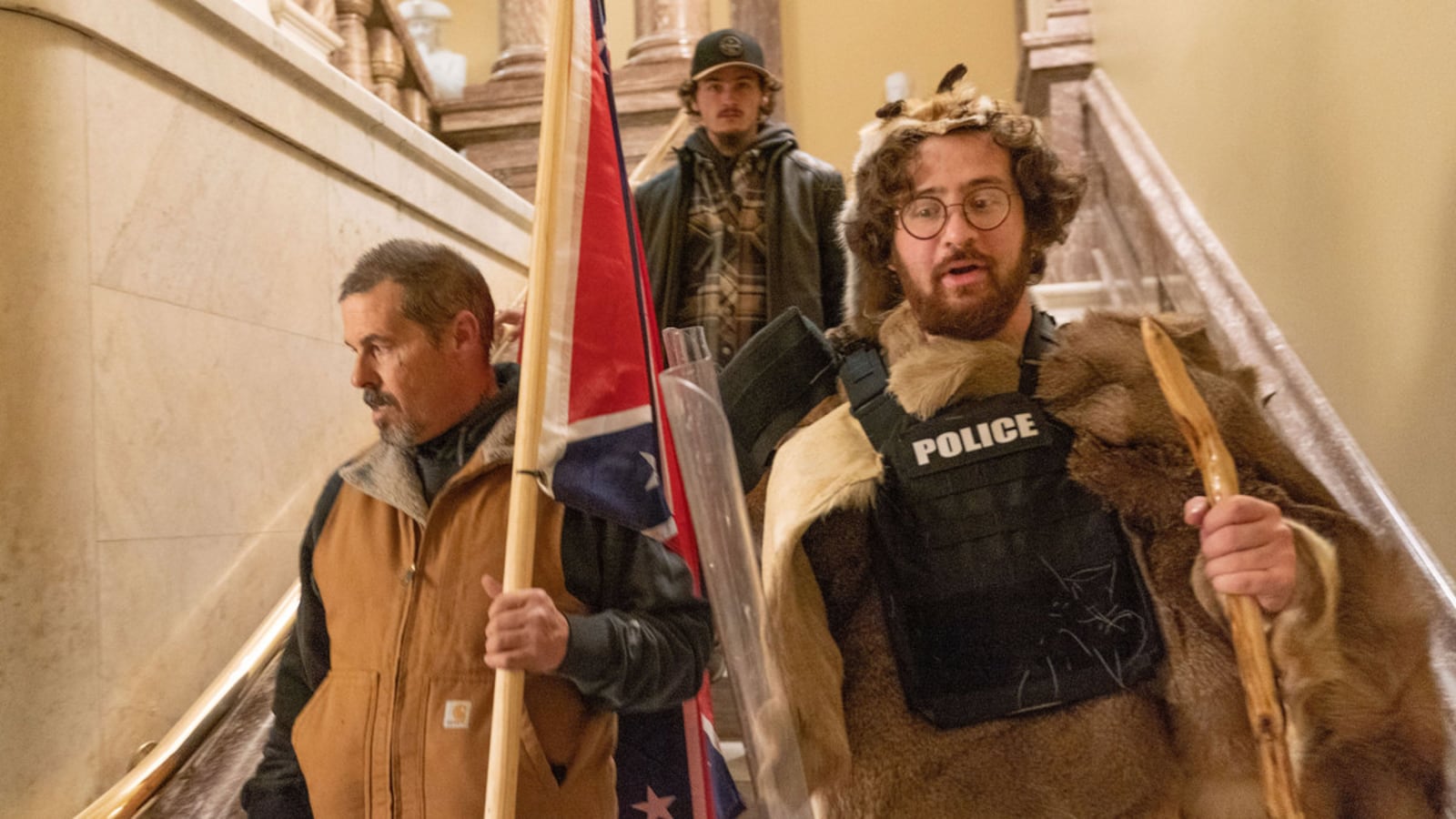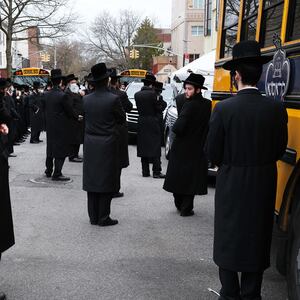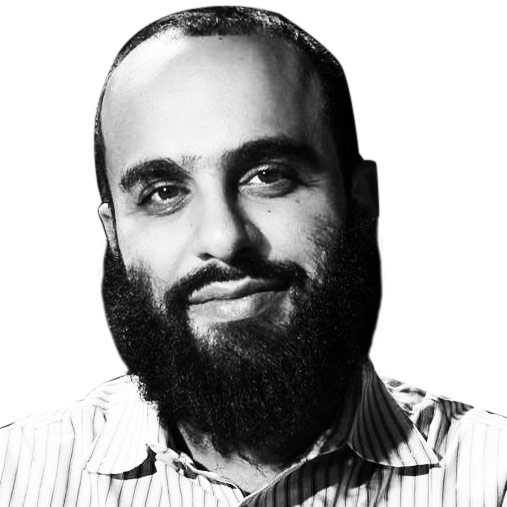When I found out that an old friend from my former Jewish Haredi community had participated in a violent coup to overthrow the government, I felt pain, anger and despair. But I didn’t feel surprise.
For the last five years, I’ve looked on in horror as more and more people from that community have been sucked into the cult of Trumpism. From embracing the tenets of white nationalism to the beatings of two Haredi whistleblowers instigated by the Haredi world’s own little Trump, Heshy Tischler, Trumpism has become an infection within the world I once called home.
That infection was raging on Jan. 6, when my friend, who I’m not naming here because the only attention he deserves is from the FBI, joined buses full of Orthodox Jews from New York—including Aaron Mostofsky, the young man in the animal pelt costume seen taking a police officer’s shield and who was arrested days later—to join the neo-Nazis, QAnon conspiracists, and white nationalists at the day’s protests that became a riot. My friend had always struck me as quiet and shy. Not the kind of person who would attend any sort of political protest, let alone an armed insurrection.
Thinking about what had happened to him, I flashed back to another time in my life when I’d witnessed a political riot.
I had started my journey into Haredi Judaism, studying in a yeshiva in Israel made to help secular Jews transition into the Haredi world. I was also starting my work as a writer, writing for a Haredi publication that had me covering a story about a group of settlers who had bought a large home in the disputed territory of Hebron. After the government declared the purchase illegal, a large group of settlers moved into the home, insisting that they would not allow the government to expel the families living there. Having been recently radicalized by their experience being expelled from Gaza after the evacuation of Gush Katif, many of these settlers had decided that “this time” they wouldn’t be nonviolent. They would fight.
I happened to be there, a sympathetic observer who was quickly becoming radically right wing despite my liberal upbringing, on the day the police and army came to remove them from the home. What I witnessed, as I look back on it, was not vastly different from what we saw at the Capitol last week. When the police arrived, a full blown riot took place, with all the young men, as well as a sizable number of young women, fighting at the frontlines, and attacking their own people with everything at hand. Although they were mostly bested, I did witness a group of them surround a police officer, steal his baton, and chase him away.
That night, I discovered that some of those same young men had then gone into the hills of Hebron and attacked the Palestinians living in the city.
This memory struck me after the riot on the Capitol because I realized that my friend was another version of what I had seen in the riot in Israel. Young men, mostly in their 20s and 30s, joining an extremist movement and being its front-line soldiers.
I saw the same type when I wrote about the riots instigated by Heshy Tischler, who declared “You are my soldiers!” and let those young men engage in the actual beatings that he’d called for. And when he was arrested for instigating those beatings, his “fan account” publicly shared the address of one of the victims of his beatings, leading to a lynch mob arriving at his apartment, stopped only by a row of police who stood outside.
All of them were young men. All of them were overcome with anger. And it didn’t matter whether they were shy and nice in their daily lives, something about Tischler inspired and moved them to act—and to commit violence.
There was another young, impressionable, radicalized young man at the riot in Israel. Me.
Only a few years earlier, I had experienced the most profound trauma of my life: A manic episode, which led to a near-death experience, a stay at a mental hospital, and a diagnosis of bipolar disorder.
I didn’t realize it until recently, while interviewing experts on cults for an article, that this sort of vulnerable mindset is exactly how so many people end up in extremist movements.
Looking for answers, I had discovered what is popularly known as a “Chabad house” on my college campus. Chabad is a sect of Hasidism known for its missionary work among secular Jews. They have centers all over the world, with some of their most popular being on college campuses. It is this community that I eventually joined.
It was in Israel, however, when I became far more radicalized. Surrounded by teachers, rabbis, and peers who were all passionate Haredi and right wing extremists, I figured that it made sense to re-examine my politics just as I had re-examined my religious beliefs.
In other words, at this time in my life, I was not much different than the young men who stormed the capitol or the young men who fought Israeli soldiers and then rampaged through Hebron. In fact, my article about the experience was deeply sympathetic to their plight. Only a year earlier I would have been shocked at myself for writing such a piece.
But I had been lonely, afraid, and desperate for answers in a scary world for years, and so finding an entire community of people who offered respite from this pain and fear was better than therapy. It gave me an immediate feeling of belonging and purpose, and promised me answers to my most desperate questions.
Most people in my situation would die for that. Many of them would kill for it.
There is, however, a cost that comes with such communal cohesion: total loyalty to the mission and, on the flip side, punishment for any disloyalty. It was this devil’s bargain that eventually convinced me to leave Haredi Judaism. While I initially became a popular commentator and writer in my community, as I started to call out problems the backlash I experienced grew astronomically. One communal dispute I was involved in led to people being chased into synagogues, spit on, and called Nazis by many in the community (and ignored or justified by the rest). When I started to speak out against the Trumpist community, I found myself suddenly a complete outsider. Articles were written about me and other liberal Orthodox Jews calling us “fake Orthodox Jews.” I was yelled at on the streets while walking with my children. It was in Trumpism that I saw just how far down the rabbit hole blind loyalty to a community can take someone, and I finally decided that it was no longer worth the price.
Even with all that, I was blessed not to have a Heshy Tischler or a Donald Trump in my life. These are the last ingredient that turns young men from extremists into soldiers: Standing on the sidelines while others die, they provide the sense of meaning the young men in their stead are desperately looking for, with the tradeoff being complete loyalty to their perverted causes.
In this sense, then, it should not be surprising that extremism has become such a danger among the young and young-ish men in the Haredi world. While communal leaders are effective at hiding the truth, the Haredi world is in disarray, especially among the young.
Of the 240,000 Haredi Jews living in New York, 43 percent are defined as poor and 16 percent as near-poor, and 51.8 percent of them receive SNAP food assistance. All of this is even more pronounced for 18 to 34 year olds, just as it is with America at large.
Secular education is abysmal, making all of these issues far deeper.
On top of that, many in the Haredi world feel a similar threat to their values in the United States as evangelicals do: many see progressive and liberal ideologies as existential dangers (I would hear this throughout my time in the Haredi world, from rabbis and community members alike). To many, Trump’s rise was in many ways seen as their last shot at their religious conservatism staying relevant.
To put it more directly: it is increasingly clear that young Haredi men are feeling an intense loss of significance and belonging. Largely living in blue states, they are even more likely to feel this loss acutely.
I’ll never forget when my friend shared a tweet about Pizzagate in 2016. He never struck me as an extremist: In yeshiva, he was more interested in sports than in studying Torah. When I first saw him in Crown Heights, Brooklyn (the home of the Chabad movement), he told me that he had actually been feeling pretty disenchanted with the community.
As time passed, he would tell me about how hard it was for an out-of-the-box guy like him to find a wife. He didn’t grow up religious, he didn’t have money, and he didn’t wear the outfit most Hasidic Jews wore.
Looking back, however, all of that makes it incredibly obvious that he’d be open to right-wing extremism and conspiracies. A young man looking for a home, unable to find one in the one he turned his life upside down for, and increasingly feeling insignificant: Of course Trump attracted him. Trump preys on those men.
In this sense, I see the Haredi world as a microcosm of America at large, and a warning to the country as well. The community’s leaders have repeatedly failed their own people, and instead of addressing their problems have demonized anyone who dared speak out, likening them to anti-Semites and even claiming that some reformers are the root cause of anti-Semitic attacks. Like so many Republican leaders, they create problems and then point at an “other” to blame it on. What Republicans didn’t see coming, and what Haredi leaders also didn’t expect, is that when they stoke that anger and fear long enough, someone more narcissistic and evil is likely to take it to its logical conclusion.
In that sense, Trump and Tischler aren’t the cause of extremism in America or the Haredi world. They are the logical end result of broken societies.



